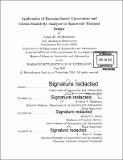Application of Bayesian-based uncertainty and global sensitivity analyses to spacecraft thermal design
Author(s)
McMenamin, Conor B. (Conor Brendan)
DownloadFull printable version (17.27Mb)
Other Contributors
Massachusetts Institute of Technology. Department of Aeronautics and Astronautics.
Advisor
Rebecca A. Masterson and Richard P. Binzel.
Terms of use
Metadata
Show full item recordAbstract
As satellite design has increased in complexity, the evolution of thermal engineering of spacecraft has plateaued. For years, thermal engineers have used the same principles of designing to stacked worst case scenarios and applying additional margin on top of the already conservative predictions. Recent publications have proposed the use of Bayesian-based propabilistic tools in the design of spacecraft in the effort to avoid overly conservative thermal designs. An issue with utilizing these tools is the typically high computational cost associated with traditional thermal modeling. To help bridge the gap from state-of-the-art to industry standard, this thesis develops a methodology to reduce simulation time and implement these analysis techniques in the industry standard software, Cullimore & Ring Technologies Inc., Thermal Desktop. These design methods are applied to the REgolith X-ray Imaging Spectrometer (REXIS), a student built x-ray spectrometer aboard NASA's OSIRIS-REx mission. Uncertainty analysis shows the area of the main instrument's radiator could have been reduced by 11%, as compared to the design obtained from conventional techniques, and still have a 99% probability of meeting the thermal requirements in all mission phases. Furthermore, global sensitivity analysis results provide insight into the thermal design of the instrument which could have been used to avoid anomalies experienced during integration and testing. Overall, results show that previously established analysis techniques scale to more complex thermal systems and the insights gained from these methodologies can significantly reduce thermal overdesign.
Description
Thesis: S.M., Massachusetts Institute of Technology, Department of Aeronautics and Astronautics, 2016. Cataloged from PDF version of thesis. Includes bibliographical references (pages 107-112).
Date issued
2016Department
Massachusetts Institute of Technology. Department of Aeronautics and AstronauticsPublisher
Massachusetts Institute of Technology
Keywords
Aeronautics and Astronautics.